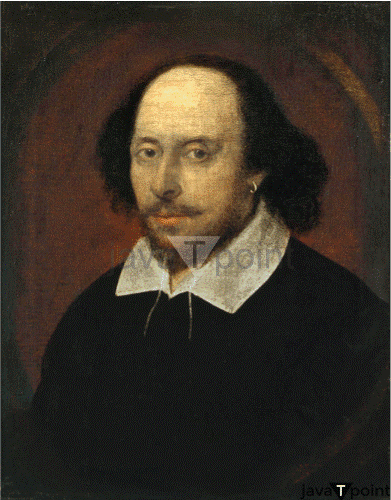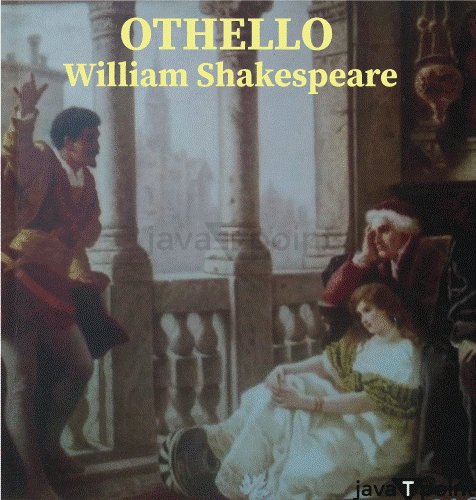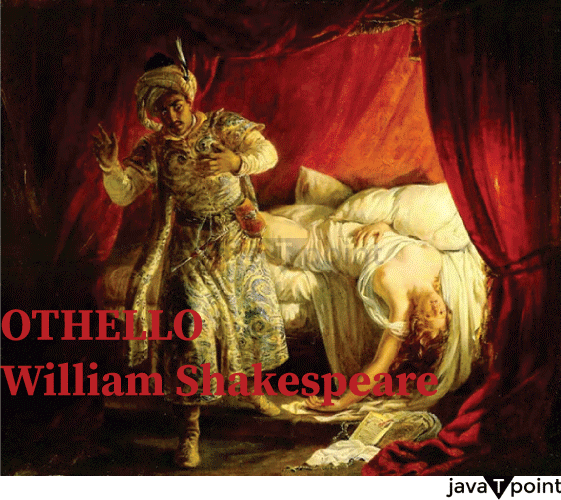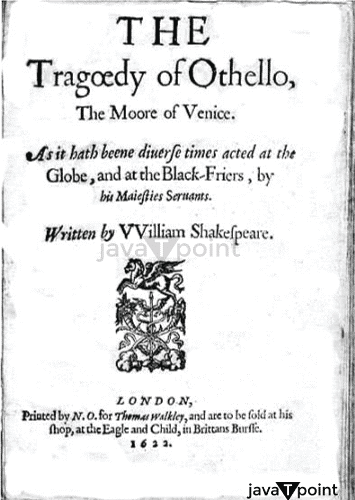Summary of Othello by William ShakespeareAlong with Hamlet, Macbeth, King Lear, and Romeo and Juliet, Othello is one of Shakespeare's five most well-known and extensively researched tragedies. William Shakespeare's tragedy "Othello" focuses on themes of jealously, betrayal, and the fatal power of unrestrained emotions. The play is set in Venice and Cyprus and revolves on the major character, Othello, a noble Moorish general in the Venetian army. About the AuthorWilliam Shakespeare was an English playwright, poet, and actor (who lived from 26 April 1564 to 23 April 1616). He is normally regarded as the greatest playwright and English-language novelist in history. The "Bard of Avon" (also known as "the Bard") is the title given to him as the England's national poet. His published works consist of 39 plays, 154 sonnets, three complete narrative poems and other verses which includes with the partnership. He has performed plays more often than any other dramatist, and they have been translated into every significant dialect today. He is undoubtedly the most excellent author to have ever lived in England, and booklovers as well as professors still read and study his works today. 
Shakespeare was born and raised in Stratford-upon-Avon which is a town in Warwickshire. At 18, he wed Anne Hathaway and the two blessed with three children named as Susanna, Hamnet, and Judith. Between 1585 and 1592, he enjoyed a prosperous career in London as an actor, a writer and a co-owner of the Lord Chamberlain's Men, later known as the King's Men. At the age of 49(around 1613) , he appears to have retired to Stratford, where he passed away three years later. Shakespeare's private life is mostly unknown, which has sparked speculation about his physical traits, sexual preferences, affiliations with particular religions, and whether or not the works attributed to him were written by others. The majority of Shakespeare's best-known works were written between 1589 and 1613. His early writings, mostly comedies, and histories are regarded as some of the best in their respective genres. Until 1608, Shakespeare primarily wrote tragedies, including Hamlet, Romeo and Juliet, Othello, King Lear, and Macbeth which are widely recognized as some of the greatest literary works ever written in English. During Shakespeare's lifetime, many of his plays were published in variable quality and accurate versions. However in 1623, two of Shakespeare's fellow players and friends, John Heminges and Henry Condell published the First Folio that is a posthumous collected edition of Shakespeare's dramatic works that comprised all but two of his plays. Its Preface was a foresighted poem by Ben Jonson, a former adversary of Shakespeare, in which he praised Shakespeare with the now-famous term "not of an age, but for all time." After his popularity as a playwright, Shakespeare continued to appear in his own and other plays. OthelloWilliam Shakespeare's Othello (full title: The Tragedy of Othello, the Moor of Venice) is a tragedy written in 1603. Othello and Iago are the main characters in the story. Othello is a Moorish military commander who served as a general in the Venetian army defending Cyprus against the Ottoman Turk invasion. Against her father's wishes he recently married Desdemona who is a beautiful and affluent Venetian lady and much younger than himself. Iago is Othello's malicious ensign, who stokes his master's anger until the normally stoic Moor murders his beloved wife in a rage. With numerous versions, Othello is still topical and famous because of its enduring themes of desire, jealousy, and race. Characters
Plot of OthelloAct IRoderigo, a wealthy and dissolute nobleman, complains to his buddy Iago, an ensign, because Iago has not told him about the secret marriage between Desdemona, the daughter of Senator Brabantio, and Othello, a Moorish general in the Venetian army. Roderigo is unhappy because he loves Desdemona and has asked her father, Brabantio, for her hand in marriage. Iago believes Cassio to be a less skilled soldier than himself and Iago hates Othello for promoting Cassio above Iago. Iago tells Roderigo that he intends to exploit Othello against him and persuades him to wake Brabantio and tell him of his daughter's elopement. In the meantime, Iago sneaks off to warn Othello that Brabantio is coming for him. 
Brabantio becomes outraged after being provoked by Roderigo and attempts to confront Othello but finds Othello's mansion filled with the Duke of Venice's guards, who prevent violence. The news that the Turks are planning an attack on Cyprus has reached Venice and Othello is summoned to advice the senators. Brabantio has no choice but to accompany Othello to the Duke's palace where he accuses Othello of witchcraft in courting Desdemona. Othello defends himself in front of the Duke of Venice, Brabantio's cousins Lodovico and Gratiano, and several senators. Othello argues that Desdemona fell in love with him because of the tragic and compelling stories he said about his life before Venice which was not because of any witchcraft. The Senate is pleased when Desdemona confirms her love for Othello, but Brabantio leaves by saying that Desdemona will betray Othello in the words of "Look to her, Moor, if thou hast eyes to see." "She has deceived her father, and may thee." Iago, who is still in the room notices Brabantio's remark. By Duke's order, Othello leaves Venice to command Venetian soldiers against invading Turks on Cyprus, accompanied by his new wife, his new lieutenant Cassio, his ensign Iago, and Iago's wife, Emilia, as Desdemona's attendant. Act IIWhen the party arrives in Cyprus, they discover a storm has destroyed the Turkish fleet. Othello plans a large celebration before leaving for his marriage with Desdemona. In his absence, Iago made Cassio drunk and influences Roderigo to provoke Cassio into a fight. Montano tries to calm down an furious and drunk Cassio. This results in them fighting and Montano being injured. Othello arrives and interrogates the men about what happened. Othello accuses Cassio of causing the disturbance and dismisses him from his position. Iago then persuades Cassio, who is distressed, to urge Desdemona to persuade her husband to reinstate him. Act IIIIago persuades Othello to be wary of Cassio and Desdemona's relationship. Iago asks Emilia to give him a handkerchief that Desdemona drops (the first gift Othello ever gave her), but Emilia doesn't know what he intends to do with it. Othello comes and, convinced by Iago of his wife's unfaithfulness to his captain, vows with Iago to kill Desdemona and Cassio, after which he appoints Iago as his lieutenant. Act IVIago places the handkerchief in Cassio's room and instructs Othello to observe Cassio's behaviour while Iago questions him. Iago goads Cassio into discussing his affair with Bianca, a local courtesan, but says her name so quietly that Othello thinks the two men are discussing Desdemona. Later, Bianca accuses Cassio of second-hand gift from another lover and giving it to her. When Othello notices this, Iago persuades him that Cassio received the handkerchief from Desdemona. Enraged and heartbroken, Othello decides to murder his wife and orders Iago to murder Cassio. Desdemona's existence is much more terrible when Othello strikes her in front of visiting Venetian nobility. Meanwhile, Roderigo complains to Iago that he has had no returns in exchange for his money and attempts to win Desdemona, but Iago persuades him to murder Cassio. Act VAfter Cassio leaves Bianca's lodgings, Roderigo unsuccessfully attacks Cassio in the street, and Cassio wounds Roderigo. During the clash, Iago appears behind Cassio and severely wounds his leg. Iago manages to conceal his identity in the darkness, and when Lodovico and Gratiano hear Cassio's calls for help, Iago joins them. When Cassio recognizes Roderigo as one of his assailants, Iago secretly stabs him to death to prevent him from revealing the plot. Iago then accuses Bianca of being part of the unsuccessful conspiracy to assassinate Cassio. Desdemona is sleeping when Othello confronts her. He smothers her even if she denies being unfaithful. Desdemona defends her husband before dying, and Othello accuses her of infidelity when Emilia comes. Emilia requests assistance. Montano who is the previous governor, arrives with Gratiano and Iago. Emilia realizes what Iago has done when Othello uses the handkerchief as proof, and she exposes him. 
Eventually comprehending Desdemona's innocence, Othello stabs Iago (but not fatally), accusing him of being a devil, but not before Iago stabs Emilia to death in the brawl. Iago refuses to explain his motivations and vows to remain silent from that point forward. Lodovico captures Iago and Othello for the murders of Roderigo, Emilia, and Desdemona, but Othello kills himself. Lodovico names Cassio as Othello's successor and urges him to punish Iago justly. He then condemns Iago's behaviour and departs to inform the others of what has happened. Short Summary of OthelloOthello and Iago are the main characters in the story. Othello is a Moorish general in the Venetian army who leads his troops into a battle with the Ottoman Turks for Cyprus. On the other hand, Iago is enraged because Othello has appointed Cassio as his lieutenant instead of him. Othello has secretly married Desdemona, a beautiful and wealthy white Venetian who is much younger than he is, despite her father's wishes. Iago cruelly incites his master's jealousy to the point where the typically stoic North African murders his beloved wife in a rage and then commits suicide. Theme of OthelloShakespeare explores topics like envy, racism, and reality versus appearance in Othello. The primary characters in the drama are motivated by jealousy. From the beginning, Iago is portrayed as a jealous figure. In the first scene, he complains that Othello promotes Cassio instead of him. His extreme antipathy stems from his suspicion that Othello is having an affair with Emilia, his wife. His passionate jealousy drives him to exact revenge on Othello, even though his suspicions are merely rumours. Iago causes Othello to suffer and experience the torments of jealousy towards Desdemona and her imagined lover by cruelly provoking his master's jealousy. 
Racism is another central subject of Othello. The main character is a Moor, and many characters criticise him based on his skin colour. When Othello marries a white woman, Iago tells her father that 'even now, an old black ram/is tupping your white ewe,' equating Othello and Desdemona with animals (Act 1, Scene 1, lines 97-98). Even when other men defend Othello, they do so by pointing out that his skin is not as dark as it appears: 'your son-in-law is more fair than black' (Act 1, Scene 3, line 331). Fully aware of how other people view him and his colour of skin, Othello struggles with feelings of inferiority and internalized racism, which Iago exploits to destroy Othello. Even as he is angry to hear about an alleged affair, Othello reflects that he has corrupted Desdemona, associating her degeneration with his skin colour: 'Her name... is now begrimed and black/As mine own face' (Act 3, Scene 3, lines 441-43). Othello's fears eventually drive him to murder his wife, so proving the belief that he is tainted because of his skin colour. Thus, whether Othello is a racist play or if the plot seeks to refer to a racist society creating its own self-fulfilling prophecies has been debated for ages. In terms of representation, the figure has generally been played by an actor in blackface throughout the centuries, notably the 1965 film version starring Laurence Olivier. ConclusionFinally, it might be said that Othello's jealousy is primarily driven by his blindness to his wife's loving methods toward him compared to others in general and his mind being poisoned by Iago. His doubts about his genuine involvement in courting his wife and his discomfort with Desdemona's role in their marriage erode his trust in her. William Shakespeare's "Othello" is a strong tragedy that goes into the devastating aspects of jealously, manipulation, and unrestricted emotions. The plot of the play tells the collapse of Othello, a noble and admired general who is driven insane by the creative scheming of his ensign, Iago. |
 For Videos Join Our Youtube Channel: Join Now
For Videos Join Our Youtube Channel: Join Now
Feedback
- Send your Feedback to [email protected]
Help Others, Please Share









